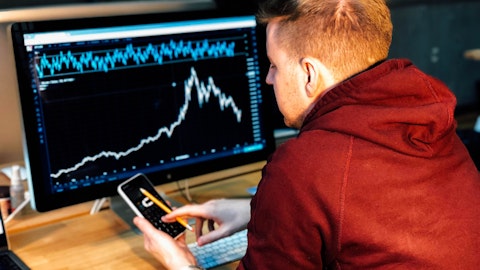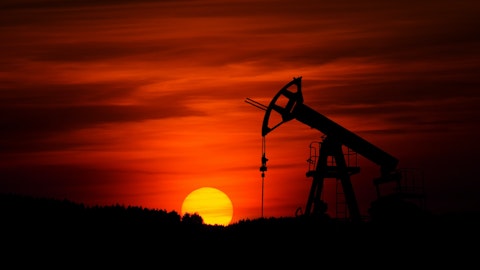Bill Dezellem : I have two questions. First of all, would you please discuss further your comment in the press release that you are looking and expect to deliver more synergies with TransGlobe than originally anticipated? And I guess the spirit of the question is I know you noted in — early in the call, 5 million of savings has been achieved and you’re looking for an additional 5 million with other administrative type expenses. Was that really the essence of the comment? Or was there more beyond that, that we should be thinking about?
George Maxwell : I’ll take the first part of the question, Bill, and I’ll let Ron take the second part on the synergies. When we look at the expectation of further synergies, we’re already — when we look at the operating part of the business, both in Egypt and Canada, we’re looking at how we improve the efficiencies of these operations. So when we look at what we’ve been doing at the moment through the latter part of Q4 and the majority of Q1 and the drilling campaign in Egypt, we’ve been reducing the time between drilling complete cycles. We, in the last — in the last two wells, we’ve hit record reductions in that cycle time. So we’re starting to see much more greater efficiencies when it comes to the drilling operations inside Egypt.
We’re applying that same methodology and with no same challenges to Canada to reduce the cycle time between drill and completion and hookup. So that allows us to have these great synergies, have the oil on production at a much earlier time and obviously becomes much more efficient for our capital spend.
Ron Bain : Yes. Just taking the — mainly the G&A component part of that synergies as well, Bill, I think we put on our investment deck back at the time when we were looking for the shareholder vote, that we were looking somewhere between 3 million and 5 million on the short term, we’ve got more than 5 million on the G&A side right away. That’s really achieved on a couple of fronts. First of all, we had the situation where TransGlobe was not only listed in Toronto but listed in London, too. So we managed to combine and with the local listing we’ve managed to get out of those particular filings. So that saved a considerable cost. The UK office, we effectively were the TransGlobe executives were based. All those TransGlobe executives, they left the business on basically mid-January.
So we got the savings that we were targeting very, very quickly. We’ve had a number of others in there that we’ve identified and worked through, including insurance costs, including the interest cost that they had on their ATB facility. There’s a variety of different professional services that — when we look at it, we’re not — we’re duplicative for both businesses, and we’ve managed to take those out. So more than 5 already achieved. I think where we’re really focusing on from a G&A point of view now is we’re looking at back-office functions. We’re looking at I would think we will be looking at an ERP tool in the near future so that we can get everyone on the same system rather than having three or four different systems, which we’ve got today.
That in itself will bring efficiencies and I would say, improvements in our control process, too. So that’s what we target and build for 2023.
Bill Dezellem : That’s helpful. And then relative to the Arta 77HC well in Egypt that you said had encountered some good sands. What’s the time line to bring that on? And with the wells you are drilling in Egypt, what do you think about in terms of the — what is a more normal production level?
George Maxwell : Okay. The well is on clean up right now. So I can’t really on the production rate until the completion of cleanup is done, but it is flowing. When we look at the changes we’re making in both cycle time and production efficiencies inside Egypt. I mean I think we had Egypt going down around 10,000 barrels a day working interest towards the turn of the year. We’re already seeing at least a 10% improvement in that as we come into the end of Q1 on a working interest — sorry, on a gross basis on a gross basis. So we do start to see improvement. We are looking at how much more we can get efficiency out into the production system in Egypt. We’ve looked at some of the activities that they perform annually in turn emptying to the storage facility, and we’re looking at moving these quarterly to reduce these cycles that we see traditionally in Q3.
So — and I think we’re starting to see benefits from that. When we look at the relationship between the company and its joint venture partner in EGPC, we’re seeing considerable improvements there in cooperation. And again, in how we execute the program. So I think we’re still very hopeful that we can continue to improve the efficiencies in Egypt. It is one of our key focuses. You heard Ron talked earlier about the cash situation and how we’ve been managing that in Egypt. We are — we’ve seen other operators make statements around Egypt and the cash position as regard to the difficulties in liquidity that, that country is going through. We keep a very close focus on that and a very close dialogue. We will — as long as the operation and the interaction with our partners remains as it is at the moment, we will continue to make the improvements and make the investments.
Bill Dezellem : That’s helpful. And then my final question is that you spent — got a fair amount of time in multiple components of your opening remarks or your prepared remarks referencing VAALCO being undervalued. With that being said, what do you think investors are missing, whether it be relative to the TransGlobe acquisition or in total today that’s leading to that lack of favorable valuation?
George Maxwell : That’s a good question. I mean, as we’ve discussed in the past, traditionally, in either the London market or the New York market, West African or an African-focused producer always trades at a discount. But the level of discount is what we need to discuss. What’s the market missing? Well, I think we’ve made a big step towards giving the market the confidence with the value issues today because what the market may have been missing and it’s a number of questions have come from the analysts both in London and here in the United States, its longevity. Where are the reserves? Where is the position that goes two, three, four years out? That we can invest in that gives you suture to cash flow. The TransGlobe acquisition, in addition to the position we have in Gabon, provides that surety.
The development that we’ve went forward with in Equatorial Guinea that gives us that forward-looking position. It puts — it puts a lot more value into our balance sheet in 2022 through Equatorial Guinea through the acquisition than has ever been there before. And I think the market is missing that at the moment. We continue — from the numbers we’ve guided to for 2023, we’re guiding to a significant number in revenue and production which will lead itself to a significant number in EBITDAX that we don’t guide to, but people can work that out. So I think once the analysts sit down and run that equation, and you say that you’re basically running at sometimes less than 2x EBITDAX, then we’re looking for that step change in value as we continue to emphasize these values are on our balance sheet.
Bill Dezellem : Great. Thank you both. And have a good weekend.




